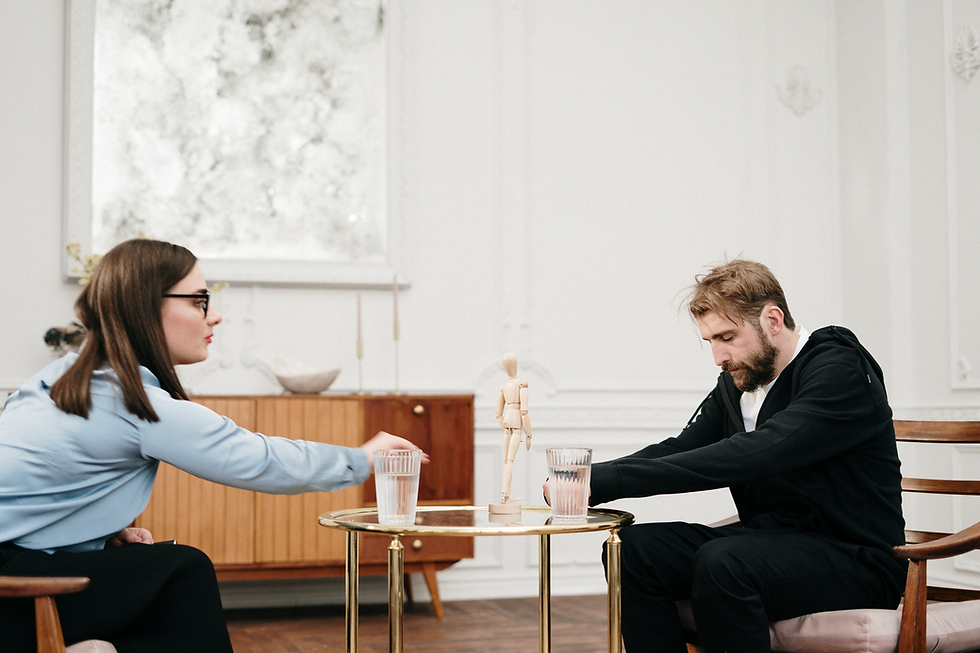Social Media and Fashion: The Deadly Cocktail
- Liam Mclaughlan

- Oct 15, 2021
- 4 min read

With nearly 4 billion users worldwide, it is safe to say that social media has taken the world by storm. Everyone and their nan has an account in some form or another. Facebook, Twitter and Instagram are some of the biggest companies on the planet as a result. Social media is allowing us to interact at levels never before seen in human history. These platforms now act as the great playgrounds for fashion brands to promote the latest clothing items and trends.
Unfortunately, high levels of social media consumption are linked to equally high levels of depression and anxiety. It should be no surprise then that while social media has continued to rise, mental health has plummeted. 66% of teenagers who reported high social media usage had higher levels of depression than 13% of teenagers who had limited their usage. While social media allows you to talk to your friends and family whenever you want, it also allows for you to make unhealthy comparisons about your life between you and those very same people. Rates of dissatisfaction are at an all-time high and the issue is being exacerbated by the fashion industry's presence online.
Looking in the Mirror...
The fashion industry has always had a problem of promoting unrealistic standards of body image. We have been told that sexy is white and skinny, and anything else is undesirable. Many people across the world, particularly women, feel the pressure to meet these ideals. The pressure placed on society to meet these unrealistic ideals has created countless cases of depression, anxiety, eating disorders and body dysmorphia.
With the fashion industry's presence on social media, these problems have simply spread further. 227 female university students reported feeling insecure about their body image when they saw a model or a female celebrity on social media. Social media enables unhealthy comparisons to be made with the people you see online. This is particularly harmful for the younger generation, seeing these images during a foundational time for the forming of self-esteem and mental health. The rates of self-harm amongst teenagers is alarmingly high, with more than 100,000 having self-harmed, nearly three-quarters of which were girls. The democratisation of the internet has expanded the reach of our culture's unhealthiest aspects, and it is poisoning us.
Enough is Enough
We have allowed fashion brands to get away with promoting these unhealthy ideals for too long. Our fashion brands have told us that if we do not look a certain way then we are not acceptable. The only thing unacceptable is that idea. Everyone is unique and different. Our fashion industry should be promoting acceptance and making people feel as if they are included in society. Social media makes this easier than ever, allowing so many voices to be heard. Ashley Graham is a plus sized model who has gained a vast following on social media for her advocacy of the inclusion of more plus-sized models in fashion. She is single-handedly making women feel more accepting of their bodies.
But it is not just about your size. Millions of people suffer from acne, have stretch marks and body hair. They do not make anyone any less of a person than they deserve to feel, yet this is not represented by our fashion industry. To destigmatise these things, we need to show that they are normal. It is important people feel accepted for who you are, because you can't change who you are.
Our fashion brands must still do more, however. They must make more people aware of what mental health is. There is still a crippling lack of education on mental health, despite nine out of ten people suffering from difficulties related to it. Showing that it is acceptable to be depressed or anxious is a big step in the right direction. Mental health awareness day sees our most popular fashion brands speak out, but there needs to be more of it. One day is not enough for a lifetime. Social media has created a new set of responsibilities for these companies to uphold. We cannot wait another day.
Change is Coming?
I bet you were asking yourself while reading that: 'What brands are there that are considerate to my mental health?' You're in luck then. Here are three fashion brands to follow who are considerate to your mental health:
Madhappy
Madhappy's mission statement is to 'make the world a more optimistic place', and they are taking it there. The company model their cheerful, bright coloured outfits with diversity, with people of colour and plus-sized people being represented. Their clothes come in a range of sizes and are not restricted to smaller people. They seek to empower sufferers of mental illness, having a range of nameplate necklaces reading 'depression', 'bipolar' etc. Madhappy are a positive, ethical example of how to promote your fashion right.
Universal Standard
Universal Standard aim to provide clothing of all sizes, not discriminating. They have a diverse range of models ranging in ages, body size and ethnicity. They've created a space to promote people of colour and anti-racism also, providing a list of 'black owned businesses' on their website. Their clothes aren't the most affordable if you're on the lower end of the income spectrum. So this is more of an option for those who are quite well-off.
Lucy and Yak
Lucy and Yak are a small company, but are making a big impact. Dedicated to producing sustainable, affordable clothing, they are going a long way to create a more inclusive brand. They are dedicated to educating their team on mental health, fatphobia and remaining culturally sensitive. They are definitely my favourite of the three I have mentioned. Check them out, you won't regret it...
But your wallet might.



Comments